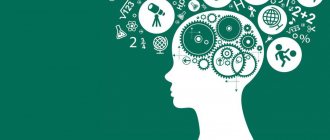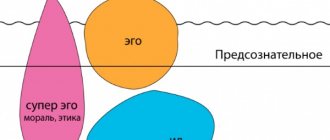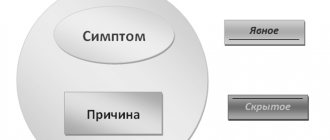Hello, dear readers of the KtoNaNovenkogo.ru blog. The word Ego is not always interpreted correctly and in most cases is perceived as a synonym for the word egoism.
But in fact, everything is not quite like that and is somewhat more complicated than it seems at first glance.
Today we will talk about what the Ego is in the theories of the father of psychoanalysis (Freud), learn about what the strength of the Ego depends on and what its functions are, and also see how it helps our psyche defend itself in difficult situations.
Ego is...
The word "ego" is of Latin origin and is translated as "I" .
The ego is that inner part of us that is in contact with the environment at a given moment in time through perception. This is what I feel, I think I know about myself at this moment in time. This is what I do through which I make choices, plan, and evaluate the situation, based on the experience of the past and the formed worldview.
For example, you are on the subway and all the seats are occupied. And then at the bus stop an elderly man comes in and asks you to give him your seat. Your ego may dictate to you: “Old age must be respected!”, or it may respond aggressively: “Here you go!” Why should I stand?! I am also tired!"
The choice of your reaction will depend on your upbringing, attitudes, stereotypes (what is this?), well-being - on what your mind is filled with in that situation.
Classification
Ego is a concept in psychology that has several varieties.
Alter ego
This is what is commonly called a state when a person is not able to correctly reflect his presence in the world around him, that is, he forms in his mind a certain personality or even a character that he could see in a film or read in a book.
This fictional hero has those character traits that he would like to see in himself (but, in fact, they are absent). This image can be deliberately created, for example, when a person often speaks in public and creates a certain image for himself. Also, Alter Egos were often found in royal dynasties, when the governors needed to appear as more powerful, wise people.
Alter Ego is also included in the pathopsychological categories. We are talking about a situation where a person suffers from multiple personality and one of them begins to predominate, gradually covering the entire life of the individual. Alter Ego can also be called False Ego, that is, it refers to a dissociative disorder or when the patient is diagnosed with multiple personality disorder.
This condition can be temporary if the human consciousness, against the background of severe stress, is divided into several persons, one of whom helps him survive a strong experience. At the same time, the Alter Ego can manifest itself to such an extent that the individual’s temperament and taste preferences completely change, and sometimes even the timbre of speech and accent change.
Accordingly, an Alter Ego can be created independently by a person or become a mental disorder that needs treatment.
Super Ego
This is a relatively new concept of the psyche, which began to develop more simultaneously with society, as well as with its norms. The Super-Ego is influenced by general standards, values, and rules. In simple words, the Super-Ego is the Super Ego. That is, a state when a person tries to organize within himself several different personalities at once, each of which must meet certain rules of the environment.
As a rule, the Superego is the last to be formed during the growing up of an individual. The fact is that this part of the psyche appears only with active social interaction. A person develops certain moral and ethical concepts, which completely change after the parent ceases to be the only person who can be right.
If proper maturation occurs and the child was brought up in favorable conditions (correctly perceives good and evil), then he will be able to transfer all this into his inner perspective and form his own inner parent.
The superego can manifest itself in different ways in human behavior. For example, in the first case we are talking about the negative. This happens when a child is often punished for bad deeds. In this case, he develops too much conscience and shame, which begin to regulate all his social feelings. However, young children, just like animals, usually do not have such experiences, because they are guided solely by their goals and ways to achieve them.
The second variant of the manifestation of the Super-Ego is excessive idealization, which is formed if the parents, on the contrary, encourage the child a lot. In this case, they put a model in children's heads that must be adhered to in order to be considered good and even ideal people.
If a child is constantly praised for following the instructions of his parents, then a clear connection begins to form in his psyche in which love, as well as a positive attitude, can only be received if he is perfect. Thus, we can say that the excellent student syndrome or the constant need to please everyone is a manifestation of the Super-Ego.
Male and female ego
The ego is also considered in psychology from the feminine and masculine perspectives. This means that initially the Ego has a dual nature, and accordingly, in every person there is both bad and good, that is, those counterbalances that are necessary for the full formation of personality. If one of these parts predominates, then the second may disappear altogether. Also, in every person there is masculine and feminine, regardless of what gender the individual belongs to.
The gender division of the Ego can be called a different perception of the world. It may differ depending on the hormonal as well as biological functions occurring in the human body. Accordingly, women and men have different instincts and form patterns of behavioral reactions.
The female ego is characterized by how much a person is able to be compliant, navigate the environment, and take care of loved ones. Also, depending on the development of this trait, aggressiveness and excessive directness may appear.
As a rule, the female Ego is more responsible for controlling what is happening, as well as her own life. If the male ego manifests itself too strongly in a person, then the female ego, on the contrary, practically disappears. In this case, the person may exhibit boastfulness and a need for recognition.
The male ego forces a person to try to achieve leadership positions, and this does not necessarily have to concern work. The same can be said about family life, when it is extremely important for a man that he is the head of the house. If the female Ego predominates in him, then, on the contrary, he will be more compliant and will always try to find the optimal solution to problems.
Finding a harmonious combination of male and female Ego is extremely difficult and such examples are extremely rare. First of all, this is explained by the fact that a woman does not want to recognize her masculine part, just as a man completely refuses the femininity of his self-presentation. This makes it more difficult to build happy relationships and achieve the success that could be achieved if an individual recognized both sides of his personality.
As a rule, the formation of male and female egos occurs before 3 years of age. Most often, this is greatly influenced by the behavior model of the parents. Accordingly, we can conclude that the male and female Ego largely depends on what country a person lives in, what social norms are followed in his environment, what is considered immoral, and so on.
Freud's theory
This term became widely known after psychoanalyst Sigmund Freud used it in his theory describing the dynamic processes of the psyche.
According to this concept (what is it?), the human psyche consists of three parts:
- Eid – contains instincts (what is this?), desires, needs (what is this?). This unconscious part exists from birth and is aimed at obtaining pleasure (sex, food, etc.).
The id is very impatient and demands that emerging needs be satisfied right here and now. Thanks to him, the individual survives.If the baby is hungry, he will cry until he is fed. If his diaper is full or his clothes are uncomfortable, the child will behave restlessly and attract the attention of adults in every possible way.
When a person’s need cannot be satisfied for a long time, intrapsychic tension and anxiety begin to grow. Often this condition develops into neurosis (what is it?).
- Super Ego – rules, social standards, moral norms and values, conscience, prohibitions and taboos (what are they?).
This is the part that makes us be good, strive for ideals and improve. She “lives” in consciousness, subconscious and preconscious, that is, everywhere. Conscience here is a controller that signals that we are doing something bad.Relying on the Super-Ego, the child begins to control his desires. If previously shame was unknown to him, and wet pants did not cause anything other than physical discomfort, then with the formation of the Super-Ego, public urination on oneself becomes unacceptable.
- Ego - a component that mediates between the Id and the Super-Ego, as well as between them and reality.
It tries to satisfy the desires of the Id, but in such a way as not to violate the laws of the Super-Ego.Often a person experiences internal conflict precisely because the Ego cannot make a choice: both the Id and the Super-Ego turn out to be equally strong, or they both contradict reality.
The energy of both is very high, and therefore a long war between them leads to mental disorders.
For example, a woman who cannot get a divorce, but really wants to (her husband beats her, but it’s a shame to be a divorcee), will most likely begin to suffer from anxiety, OCD, VSD, somatoform disorders, etc. To recover, she just needs to make a choice, taking a close look at the real state of affairs.
Definition
The word " ego " comes from Latin and means "I". The term "ego" was coined by Sigmund Freud. He divided the human psyche into three different levels of consciousness: id, ego and superego.
The id is the most deeply rooted aspect of the human psyche, an animal instinct. It is located deep in the subconscious. Its goal is to avoid pain by immediately seeking satisfaction after pleasure. It is also the desire to spread the species and the fear of death.
The ego is the executive function of the personality, the rational part of the personality, the false personality is the image of oneself. This is what a person considers himself to be, one hundred percent truth about him and his image. What he considers most important.
According to Freud, it is not there from the very beginning of life. It does not develop until some time after birth, remaining dependent on genetic factors and interactions with the environment. Its role is to reconcile conflicts of tasks on the part of instincts, conscience and the external environment. Integration of the external and internal world. This prevents a person from acting in accordance with his basic impulses. It also helps to find a balance between moral and idealistic standards.
What does this mean? For example, while driving a car, someone suddenly breaks into the road, the ego does not allow you to get out of the car and hit this person for creating such stress. The ego operates both consciously and unconsciously.
The superego is the conscience, inhibitions and obstacles, and the idea of what a person should be to conform to social and parental values. Picture of the ideal self. Morals and ideals.
Ego Power
the weakest ego . Reliance on social frameworks has not yet been formed, and reality is not yet fully understood and studied, ideas about oneself and the world are distorted and irrational. Therefore, in childhood, the Id is in full control.
It happens that the Ego does not grow with its owner. A person has grown up, but his thinking and actions remain childish. Such people are easy to recognize - they are called “reaction people”: they do and say what they think, have irrational thinking, false ideas about themselves and others.
A strong Ego is the prerogative of adults, mature individuals. Strength is manifested in the ability not to rely on the relationship between the Id and the Super-Ego, and to act based on current considerations.
A person with a strong ego has the following characteristics :
- Objectivity in relation to oneself and others;
- The ability to effectively plan your life activities;
- The ability to make decisions without hesitation or worry;
- Such a person can slow down his impulses without succumbing to temptations and temptations;
- Able to defend himself against social pressure;
- Manages his needs and resources, directing them in the right direction.
As a rule, such people are called “selfish”, because they seem to have no conscience.
These “impudent people” do not think at all about the needs of other people, putting their own values and interests first.
Most people in their actions rely on parental messages formed in childhood.
And the most useless of them all is “What will people say?” Essentially, it means “forget about yourself, think about others” - a so-so way to live your only life.
After all, we come into this world to “be”, to realize our potential, and finally to enjoy the process of life.
On the other hand, everything has extremes. Not taking off your last pants for the sake of another is healthy selfishness. But killing another to take off his pants is hedonism.
The latter is characterized by purposeful sabotage in order to satisfy one’s needs. This is an extreme degree of selfishness, which should be avoided.
Criticism
It is quite difficult to offend or offend a person with a normal ego and a correct sense of boundaries; he is stable and it is quite difficult to unbalance him. Things happen differently for people with inflated egos. Any condemnation or even the slightest assessment unsettles a person, even to the point of tears. Moreover, such a breakdown can happen absolutely out of the blue; a person can take any criticism, even one that does not apply to him, personally and become very offended.
If you overreact to criticism from others, you may have ego problems.
Ego Functions
Nothing exists for nothing: and the Ego has its own purpose. Its main functions:
- Self-determination - the individual understands who he is, what he is and why (I love this, and I hate this, I am capable of this, but I won’t do something even at gunpoint, I can do this, but I can’t do that, etc.) ;
- Socialization (what is it?) – a person represents his place in society (who to sleep with, who to work with, to be friends with, to love, etc.);
- Protection from stress and psychological trauma, in which the Ego makes it possible not to go crazy, leaving a person in contact with his feelings and the world. Or, on the contrary, breaking these connections, blocking perception (shock);
- I will not allow myself to run naked around the city, eat stray dogs and shout “crow” in a full elevator, thanks to the controlling function of the Ego;
- Forming Judgments – We constantly ask ourselves questions about how certain people and events affect us. This is how personal opinions, beliefs and habits emerge;
- Building goals occurs based on thinking about what we want. What are our ideals in family, work, relationships with people, appearance, etc., what should I strive for?
Loss in the material perception of the world
Everything is transitory, including the ego. Nothing is permanent or real. Even the atoms that form matter are in constant flux.
The only salvation is to understand that it is man who is the soul. He is a soul with a body. This is the real “I” - the conscious, initiating energy that exists outside the physical body. Light and love.
Until now, man has identified himself with his physical body and thereby placed himself within a certain framework.
You are a soul and you have a body that you use to move around the world. You need to see the soul within yourself and feel its limitlessness.
Ego and Alter Ego
Although Ego means “I,” it is not such in the full sense of the word. That is, it’s like you, but not you.
In other words: your Ego is not your essence. This is a false “I” that is formed due to the environment in which you grew up and developed.
You have been told who you are. For example: as a child you were told that your name is Masha and you are a Christian. They also said that fighting is not good, but sharing something with others is a sign of a well-mannered and good girl.
Imagine: a child born into an aristocratic family will in the future become the same as his parents - smart, educated, mannered, etc. (what qualities are instilled in them there from the cradle?) What if this same person is born in a poor area of India, where schooling is a luxury (use your imagination here)?
Then what is the true “I” of an individual? Psychoanalysts called him the Alter Ego or second “I”.
It manifests itself only in extreme conditions , when all personality masks, the burden of responsibility and complexes, parental instructions and moral teachings fall away... Then a person becomes “truly real.”
But since such emergency situations happen quite rarely, and most of our lives we exist in society and under its pressure, the Ego is perceived as the true essence of a person.
In psychology
The subpersonality, called the ego, has a significant influence on a person’s thoughts, behavior and life activities. The ego is located at the level of the individual's subconscious . It is there that the rules and beliefs she formed reside.
Many people find it difficult to agree to any changes in their lives: for example, leaving work, making new acquaintances, changing their place of residence. There are always excuses to avoid this. But at the subconscious level, a person understands that change is inevitable.
This is how the ego manifests itself. He doesn't like the uncomfortable state of having to start all over again.
Surprisingly, the ego can control a person. Moreover, he does it so strongly and convincingly that he himself quickly falls into the trap of excuses, justifications and the search for easier options. In this fight, the ego usually wins.
One of the most complete descriptions of the ego was proposed by the author of a series of books from the section of psychology and psychosomatics - Louise Bourbo.
Forms of manifestations
Ego is a rather complex but important concept in psychology. There are several forms of manifestation of this part of the personality, which allow us to determine how much influence the Ego has on a person.
| Form of manifestation of the Ego | Description |
| A person always knows everything himself | It is extremely difficult for an individual to admit that he does not know something. He tries to voice answers to any questions, even if they are completely illogical and incorrect. A person refuses to listen to other people’s opinions and does not follow the advice of family and friends. |
| There is a desire to prove your worth | Excessive manifestation of the Ego is observed if a person begins to reach the point of fanaticism in the desire to win various competitions and competitions. However, if we are talking about a child whose room is filled with certificates, cups and medals, then perhaps we are not talking about his Ego, but about an attempt at self-realization through the child of his parents. |
| A person achieves something, but stops moving forward | When a person does some significant act in life and after that lives only with memories and constant stories about it. |
Enlightenment
Definition of "enlightenment" in some sources.
In Buddhist religious practice, enlightenment is a state of clarity, awareness, understanding of practices and exit from the state of subject-object dichotomy.
Complete confusion, no clarity.
Enlightenment is a state of full awareness (going beyond the limits of the dual mind), in which the ego dissolves and the feeling of being a performer disappears, that is, the illusion of will disappears.
There is something in this definition - the concept of “Ego” appears, the word “illusion”.
Let's start looking for categories that have anything to do with “enlightenment”
I chose this list:
- Correlation of Spirit/Ego energies
- Parameters of the mental body (Consciousness) - its frequencies (vibrations) and power
- Our connection with the Spirit (Angel), Kryon calls this category the “veil” between man and Spirit.
The result is this picture:
Enlightenment is a person’s energetic state in which his connection with the Spirit has reached 50% (or more).
What determines the level of this connection? From our vibrations.
The higher the vibrations of our Consciousness, the lower the share of Ego energy and the higher the energy of the Spirit.
Let's look at this using examples of public people.
- Dalai Lama Aura purple. Spirit/Ego = 50%/50%. Connection with Spirit 10%.
- Tom Hanks Aura is golden. Spirit/Ego = 80%/20%. Connection with Spirit 20%.
- Biden Aura is red. Spirit/Ego = 20%/80%. Connection with Spirit 1%.
We must understand that the energy of the Ego is a constant value. It does not decrease, does not dissolve.
The energy of the Spirit changes - it becomes more or less.
- The lower the connection with the Spirit, the worse it is heard - a person’s intuition disappears.
- The higher the energy of the Ego is over the energy of the Spirit, the more often a person makes rational decisions, weighing the pros and cons on the scales, only the benefit received is taken into account. Own sensations (movement of the soul) disappear.










